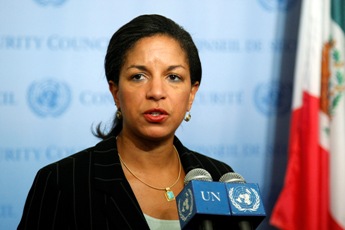US concerned about lack of urgency in ending Sudan talks: Rice
September 6, 2012 (WASHINGTON) – The United States has expressed concern over the “lack of urgency” exhibited by both Sudan and South Sudan in the implementation of the United Nations Security Council (UNSC) Resolution 2046, Susan Rice the US envoy to the UN has said.

Ambassador Rice said the US government was particularly concerned about Sudan’s continued refusal to accept the AU High-level Implementation Panel’s (AUHIP) map to create a buffer zone.
Sudan’s refusal to accept the map, as required in the UN Security Council and the AU Roadmap, led to Rice questioning Khartoum’s seriousness in resolving border and security issues.
South Sudan, despite some early criticism has accepted the AU proposed map which, once approved by both sides, will pave way for the establishment of a Safe Demilitarized Border Zone to prevent cross-border rebel attacks and to avoid the conflict over flash points such as the oil-producing region of Heglig.
In April fighting over Heglig brought the two sides back the brink of war for the first time since the 2005 peace deal that granted South Sudan the right to secede.
Khartoum’s “Irefusal has prevented the establishment of a Safe Demilitarized Border Zone and the deployment of the Joint Border Verification Monitoring Mechanism, and it risks the resumption of outright conflict,” Rice told reporters in New York.
Both Sudan and South Sudan resumed negotiations on several post-independence issues earlier this week, with the former insisting that border security remains its priority if the two countries were to clinch any final deal. Khartoum accuses Juba of continuing its support to Sudanese rebel groups .
South Sudan denies this and accuses Sudan of backing its own rebels.
The other main issue of talks is oil. In August the two sides drafted a deal for South Sudan to resume oil exportation using Sudan’s pipelines and refineries. Production stopped in January over a dispute over how much South Sudan should pay in transit fees.
Rice said it was disappointing that Khartoum had not to committed itself to the implementation of the provisional oil agreement.
The two countries reached a deal, which could see the young nation pay US$9.10 for every barrel of oil produced in Upper Nile and $11.00 for every barrel produced in Unity State. In addition Juba also offered $3 billion as a transitional financial assistance to Sudan.
“It’s our view that at a minimum, the parties should work closely now with the oil companies to take the technical steps required to ensure that oil can start flowing as soon as a final political decision is reached,” Ambassador Rice emphasized.
The US government, she said, urges the UNSC to continue playing an active role in demanding full compliance from the parties and maintain the pressure required for both parties to meet their obligations under its resolution 2046.
SUDAN CONFLICT
Meanwhile Ambassador Rice also voiced concerns on the ongoing conflict in Southern Kordofan and Blue Nile states of Sudan. The US, she said, had hoped that the signing of the Memorandum of Understanding (MoU) for humanitarian access to the two states would result in assistance swiftly reaching the hundreds of thousands of those in desperate need.
“Unfortunately, that is not yet the case,” Rice said.
According to the US envoy, renewed fighting in the two areas, which has already resulted into the displacement of tens of thousands, is likely to escalate as the dry season approaches, due to the lack of humanitarian access to the region.
“It’s crucial that the Government of Sudan and the tripartite partners [the United Nations, African Union and Arab League] redouble their efforts to implement immediately the Memorandum of Understanding on humanitarian access in order to alleviate the suffering in the two areas,” said the US envoy to the UN.
The UN say that 160,000 people have fled the conflict into Ethiopia and South Sudan, where humanitarian agencies are struggling to cope with the volume and extreme malnutrition and ill-health of the arriving refugees.
However, humanitarian agencies have not been able to reach people in areas controlled by the SPLM-N rebels. The SPLM-N fought with rebels in what is now the Republic of South Sudan against the Khartoum government during the 1983-2005 civil war. The Two Areas were granted special status under the 2005 agreement but key provisions were not completed before South Sudan seceded. The fighting began when the Sudanese Armed Forces attempted to disarm SPLM-N members.
She described as “intolerable” Sudan’s “business-as-usual” approach to the worsening humanitarian crisis in its two states, saying its Khartoum’s responsibility to care for its own people affected by conflict in the two areas and take into account the urgency the situation requires.
(ST)
